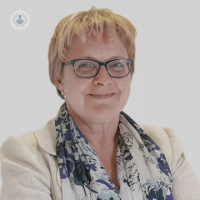Putting a stop to movement disorders
Escrito por:Most of us have heard of Parkinson’s and Huntingdon’s disease, but there’s a wide range of other conditions that can cause problems with your movement. We asked expert neurologist Dr Dora Lozsadi for an overview of the signs and symptoms of a movement disorder, and the treatments currently available.

What are the different types of movement disorders?
Movement disorders are a group of neurological conditions which compromise the ease and quality of your movements.
The kinds of movement affected might be simple, such as picking up a coin or walking, or it might be complex, such as playing the piano.
Sometimes, a movement disorder can cause involuntary movements. The most common we see is a tremor.
What are the signs of a movement disorder?
Each disorder involves a different (but often overlapping) set of symptoms. Some of the most common signs of a movement disorder include:
- losing control over the fluidity of movement
- inability to initiate movement (most commonly seen in Parkinson’s disease)
- muscle jerks
- unusual or uncontrollable posturing of body parts (dystonia)
- tremor
- restlessness (inability to keep still)
- poor co-ordination
What causes movement disorders?
It depends on the disorder in question.
Some are genetically inherited, with the most recognised example being Huntingdon’s disease. Other movement disorders have a genetic component to them – in that certain genes increase your risk of having the condition – but not everyone with such genes will develop the disorder.
Some forms of medication, most commonly antipsychotics, can bring on problems with movement. A wide variety of movement disorders are associated with alcohol abuse.
Certain medical events can trigger movement disorders. For example, a stroke can result in damage to parts of the brain that are responsible for movement and coordination. Chorea, a condition which involves brief involuntary movements in the face, arms, and legs, can occur during pregnancy, and may be mistaken for seizures.
Finally, there are some movement disorders which are idiopathic, meaning we are not certain yet of the cause. Parkinson’s disease is the most well-known example.
How are movement disorders treated?
In most cases the mainstay of treatment is medication. However, depending on what part of the body is affected, many conditions respond better to Botox injections.
If these treatments don’t work, or in cases of severe symptoms, deep brain stimulation is another option.
In addition to treating the symptoms, for some conditions it’s important to determine the chances of passing it on to your children. Many patients of a childbearing age with movement disorders are therefore offered genetic counselling to screen for hereditary conditions and make an assessment of any prenatal risks.
In the future we may see gene therapy becoming a key part of treatment for movement disorders which appear to be controlled by gene mutations. At the moment, however, this field is still in development and gene therapy is not yet available in the UK.



